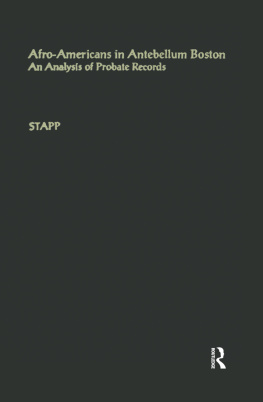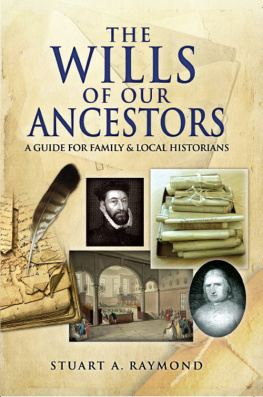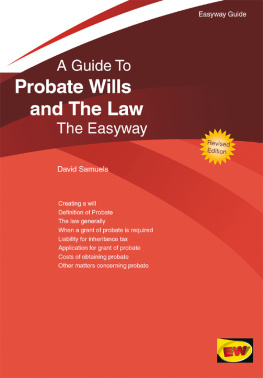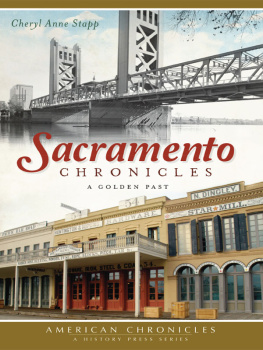Studies in
AFRICAN AMERICAN HISTORY AND CULTURE
edited by
GRAHAM HODGES
COLGATE UNIVERSITY
First published 1993 by Garland Publishing, Inc.
Published 2018 by Routledge
2 Park Square, Milton Park, Abingdon, Oxon OX14 4RN
52 Vanderbilt Avenue, New York, NY 10017
Routledge is an imprint of the Taylor & Francis Group, an informa business
First issued in paperback 2018
Copyright 1993 by Carol Buchalter Stapp
All rights reserved. No part of this book may be reprinted or reproduced or utilised in any form or by any electronic, mechanical, or other means, now known or hereafter invented, including photocopying and recording, or in any information storage or retrieval system, without permission in writing from the publishers.
Notice:
Product or corporate names may be trademarks or registered trademarks, and are used only for identification and explanation without intent to infringe.
Library of Congress Cataloging-in-Publication Data
Stapp, Carol Buchalter, 1946-
Afro-Americans in antebellum Boston : an analysis of probate records / Carol Buchalter Stapp.
p. cm. (Studies in African American history and culture)
Includes bibliographical references and index.
ISBN 0-8153-1194-X (alk. paper)
1. Afro-AmericansMassachusettsBostonHistory19th century. 2. Boston (Mass.)PopulationHistory19th century. 3. Probate recordsMassachusetts Boston. I. Title II. Series.
F73.9.N4S73 1993
974.4'61004 96073dc20
92-40357
CIP
ISBN 13: 978-1-138-87817-4 (pbk)
ISBN 13: 978-0-8153-1194-2 (hbk)
To Marcella Brenner
with admiration, appreciation, and affection
The probate records of antebellum black Bostonians offer an ideal opportunity to compare the literature to a primary source, both in terms of content and method. Critical reviews of the scholarship, first, on black social history and, then, on probate inventories as historic sources precede an examination of the probate records themselves and a comparison of the literature to probate records. The study concludes by indicating that the shortcomings of probate records arise from their leaving much mysterious or misunderstood without recourse to other sources while their strengths reside their intimate and subtle suggestions for understanding a purportedly inarticulate population. Moreover, probate records are extremely compelling primary sources, not only because they prompt the imaginative visualization of artifacts, but also because they are themselves powerful visual artifacts. Their usefulness rests upon this dual dimension as document and artifact; experiencing probate records as artifacts can breathe life into these documents about the dead.
For the sake of brevity, only two packets of transcribed probate records (in visually-inflected simulations of the originals) are reproduced in this edited version, all tables have likewise been eliminated. The complete appendix material is available through UMI. Dissertation Information Service and the Afro-Ameri can Communities Project, Smithsonian Institution.
There are many to whom I owe much gratitude: the faculty and administration of The George Washington University; my director of research, James O. Horton (Associate Professor of American History and Civilization at The George Washington University as well as Director of the Afro-American Communities Project at the Smithsonian Institution); and my two readers, Bernard M. Mergen (Professor of American Civilization at The George Washington University) and Dennis A. OToole, Vice President and Chief Education Officer of the Colonial Williamsburg Foundation). This study evolved from an opportunity to contribute to the work of the Afro-American Communities Project, housed and supported by the National Museum of American History with funding from the National Endowment for the Humanities and the Ford Foundation; and charged with investigating the lives of Afro-Americans in ten cities before the Civil War.
It is appropriate that I make note of the kindness of Ross W. Beales, Jr., Peter Benes, Beth Ann Bower, Anna L. Hawley, Bernard Herman, Gloria L. Main, Gail F. Mohanty, Barbara Nachtigall, Susan Ostroff, Sally Pierce, Julie Richter, Raymond V. Shephard Jr., Kathryn S. Smith, Laura F. Sprague, Linda Sturtz, Patricia Trautman, and Barbara McLean Ward. The following individuals helped at various stages with the preparation of the manuscript: David Scott Alvarez, Tracey Eberle, Farar Elliott, Dina Rose Friedman, William F. Lynch, Kevin McAnnaly, Philip L. Metzler, Jere A. Trout, Michael Walker, and Andrew J. M. Wheatcroft. Very great appreciation is extended to my friends Susan G. James, Judith Landau, Susan K. Nichols, Barbara F. Weissberger, and Patterson B. Williams. I also wish to thank my family, in particular my mother, Doris W. Buchalter, and my late father, Sam Buchalter, as well as my five siblingsRobert Buchalter, June B. Cohen, llene P. Buchalter, Sharon L. Buchalter, and Linda B. Overlie. Finally there are two who merit my warmest regards for caring during some trying times-William F. Stapp and my dear daughter Rosie.
Afro-Americans in Antebellum Boston
The probate records of the black population of Boston before the Civil War constitute the primary source material at the heart of this study. Probate records are official court documents associated with the legal settling of estates. The word probate derives from the Latin verb probare, to try, test, approve, or prove, and probate records may best be understood as the bureaucratic paperwork that accumulates during the process of hearing and determining questions or issues arising in matters concerning the probate of wills or the administration of decedents estates.
The Process That Probate Records Document
The process of probate in antebellum Boston can be reconstructed in broad terms. It was a practice with a long tradition, transplanted from the European Old World to the colonies, in order to ensure the payment of debts and the assignment of proper shares to the decedents heirs before assets were dissipated. In New England, real estate was included in inventories as a means to establish clear land titles; therefore, the sale of real estate during settlement to meet debts and/ or to retire mortgages had to be approved by the court.
Generally, relatively soon after a death, an interested partya widow, an heir, a creditorappeared in court, exhibiting the will (if there was one) or testifying to the death of the decedent. Once the will was proved, the executor/ executrix therein named was empowered by the court to execute the will. In the absence of a will, the court appointed an administrator/ administratrix. In either case, a bond with the executor or administrator as principal and two others as sureties was posted to guarantee the honest settlement of the estate. Appraisers were also designated to look at the deceaseds property and to draw up a list of all real estate, goods, chattels, rights, and credits, stating current market value. Oftentimes, the executor/ executrix or administrator/ administratrix compiled lists of debts. If the deceaseds personal estate was insufficient for meeting his or her debts, the court was petitioned for a license to sell the decedents real estate, if any. Commissioners of insolvency might be appointed to review and allow claims against the estate. (A widow, however, could exercise certain privileges extended by the protocol of probate to protect her economic rights. By petitioning for an allowance and a dower, she could have the court decree that a portion of her late husbands estate was not subject to his creditors.) A year after the recognition of the executor/ executrix or appointment of an administrator/ administrix, an account was returned to the court with schedules of monies received and disbursed; these accounts were rendered annually until the estate was settled. At every stage in probatefrom proving the will to declaring insolvency to returning the accountspublic notice was given through announcements in newspapers.









